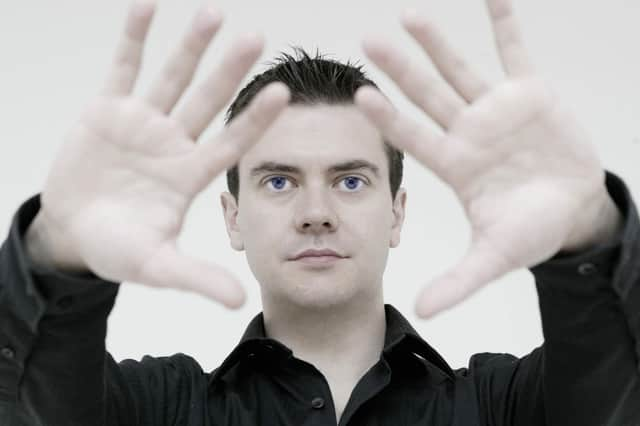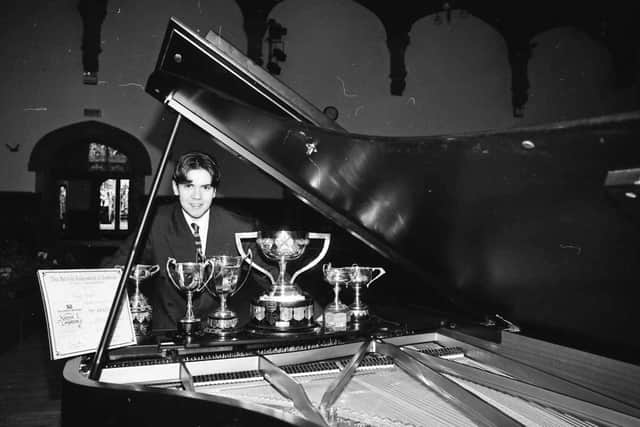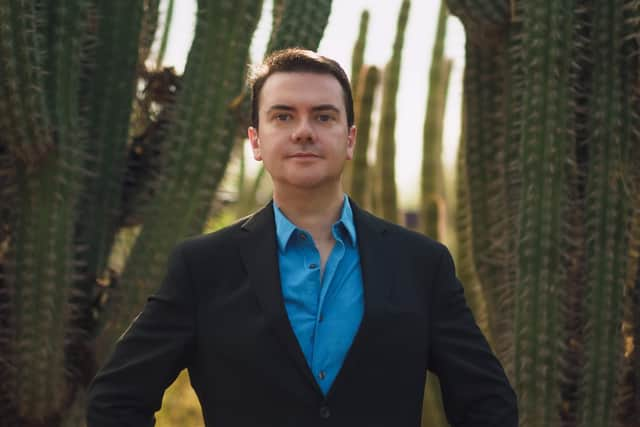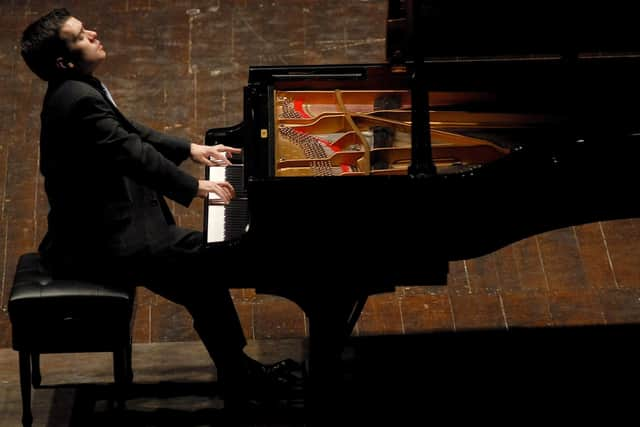DERRY FEIS 100: Cathal Breslin - Feis gives people ‘inspiration to push ahead’


As a concert pianist Cathal’s achievements are immense. He has performed concertos with an array of orchestras including the Turin Philharmonic in Italy, the Greensboro Symphony in North Carolina, the National Symphony Orchestra of Ireland, the Arizona MusicFest Chamber Players, the Ulster Orchestra, the RTE Concert Orchestra and National Youth Orchestra of Ireland.
Since its inception Derry Feis has always paid rigid attention to the classical music genre, something which has proved to be the catalyst for many professional careers in that discipline.
Advertisement
Hide AdAdvertisement
Hide AdCathal said: “I first started playing when I was about seven. I had a couple of piano lessons but then my teacher passed away. It was another few years before I found another teacher. It was an odd start. I started learning again with Rachel McGinley who is mainly a cellist, but at that time she was a student at Jordanstown and also taught piano. I was about ten when I started regular lessons with her.
“At some point Rachel decided I’d be better off auditioning for the Royal Irish Academy of Music in Dublin to take it to the next level. Her sister Ruth McGinley was already travelling up and down to Dublin. I was put in contact with Ruth’s teacher John O’Connor and a couple of others. So I started going to Dublin every week. It sounds like a crazy thing to do every week, but Ruth did the same. It wasn’t just a piano lesson, it was an all-day thing. You’d do a theory lesson and a history lesson and at some point you’d do a piano lesson.”
Cathal’s initial musical education in Dublin saw him later move onto the Royal College of Music in London where in 2001 he received a BMus (Hons) with Distinction. A Masters of Music degree followed in 2003 from the Royal Northern College of Music in Manchester as well as other postgraduate qualifications in professional performance. From 2003-2005 Cathal attended the Real Conservatio Superior de Musica de Madrid and for a further three years until 2008 he was a teaching assistant at the University of Michigan as a Fullbright Scholar, graduating with a Doctor of Musical Arts degree in Piano Performance. Cathal also spent three years teaching at the National University of Ireland in Maynooth followed by a stint at Queen’s University in Belfast before taking up a post as Assistant Professor of Piano and Director of Piano Studied at the University of Memphis.
Cathal continued: “The first time I ever did the Derry Feis I didn’t have a teacher. I don’t remember exactly when that was, but it was before I started lessons. It was definitely between the ages of seven and nine. My brother Aidan literally sat down with me and tried to help me through the pieces.”
Advertisement
Hide AdAdvertisement
Hide AdThe Derry born maestro also had the ability to play the violin, but by his own admission it was the piano that had already captured his heart and his imagination.


“I wouldn’t say violin was a love, but I played it until I was around 16. I just stopped it because the piano playing was getting very serious and time consuming. But, with the violin I did play with all the local orchestras – the Western Education and Library Board Orchestra. But because from the age of 12 I was travelling to Dublin every week for the piano, it became a bit too much. I didn’t work as hard at the violin and so I just maintained my playing, I didn’t give it as much attention. I probably shouldn’t say this, but I’d often practice the violin in front of the TV. I was just sliding around the instrument and not really following it properly.
“I think the passion was really in the piano for me. That was the challenge. That was the one that you had to break down barriers in order just to do something basic at the beginning. At the beginning, the idea of doing something simple like playing with both hands together is mind blowing. Whenever you conquer it you feel great and then there’s always the next challenge of doing something else. I think I owe a lot of that to going down to Dublin, otherwise I wouldn’t have had exposure to what was the best level in the country. Apart from that you make friends with other people from all over the place. And you get to hear other instruments as well.
“One of the best things about Derry Feis, for me anyway, I was a bit obsessed as a child about anything I could see. I would go there and spend the entire day there. I would have sat for a couple of hours and watched the dancing, then another couple of hours watching the singing, then I go over and watch the violin. My parents would just drop me off in the morning and pick me up again in the evening. Even though I competed in piano, I was going to watch everything. And the amazing thing about going to Dublin was that it was like Derry feis but it happened every week, it wasn’t just a once a year thing. I could watch lunchtime concerts performed by people my own age every single week. I always think it’s important, no matter what someone ends up doing, that they get exposure to watch things. That’s one of things that drove the interest in beginning the Walled City Music Festival – trying to create something that does that. The idea that people should get along to see things that are of great quality is just really important. I think I realised that when I was very young.
Advertisement
Hide AdAdvertisement
Hide Ad“At the feis you got to meet judges from England or Dublin or Belfast and that type of feedback is really important. Getting feedback not just from your own teacher but from people who had never heard you play before,” Cathal said.


The bulk of junior music competitions were most often played out in the old Minor Hall of the city’s Guildhall. Often the nervousness of the competitors was almost palpable, but trepidation is something that Cathal Breslin says never really affected him.
He continued: “I think nerves for me came a little bit later. A lot of people would say that too. Whenever you’re younger and you’re determined and committed to something you’re kind of fearless. Nothing creeps into your mind that something could go wrong. Then probably at some point when you’re doing GCSEs or A levels or you’re being pulled in a million different directions – that’s the point where something might happen that’s unexpected.
“I think I over prepared for everything that I was doing and I still do that. If a teacher expected me to play a piece through once without mistakes I would take the same performance and do it ten times. Or, I’d give myself a number and if I didn’t do it that number of times perfectly then it definitely wasn’t ready. Or I would try and distract myself with different things like having the radio on in the background then try to focus. I always used these unusual techniques.
Advertisement
Hide AdAdvertisement
Hide Ad“If you find something that works then stick to it. If there was a power cut at home for example and there was nothing else to do, I would go in in the dark and practise the piano. You would accidentally learn a lot from that – you would stumble upon something. In the dark you’d taken away one of your senses and when the lights came back on I found that it was stronger afterwards. You’d feel a boost from that. A lot of that happened by accident but then became part of the practise regime.”


According to Cathal his decision to pursue a career as a concert pianist was also heavily influenced by his first public performances at Derry Feis.
He said: “It was definitely a huge influence. I don’t think that I would have an opportunity to play in front of people in that pressured audience environment otherwise. I used to travel everywhere with the McGinleys, so much so that people thought I was one of them. Those were the only ways that I would have been playing in front of an audience at that age. So, it was very, very important. I don’t think I would have been as ready yet to compete in the Feis Ceoil in Dublin but for the experience at Derry Feis. It allowed me to try out much more difficult music that I’d learned in Dublin and when I’d play that in Derry sometimes the judge would be from Dublin and then I might get to meet them again at the academy in Dublin. It all went hand-in-hand.
“The only opportunity you ever had to play publicly was at the feis. Nobody is going to hire you to play concerts when you’re ten-years-old. So you relied on that network that Derry Feis, Londondonderry Feis, Carndonagh Feis and Moville Feis provided. There was a whole network. Everyone jumped from one feis to the next. I was doing that in piano and violin. We even had a string quartet at one point. Except that once we were competing in the string quartet and I forgot my violin believe it or not. That didn’t go too well. It was probably because I was doing six or seven competitions in one day,” Cathal laughed.
Advertisement
Hide AdAdvertisement
Hide AdThe intensity and technical difficulty involved in competing at the feis increased incrementally across all the disciplines as those taking part grew older and the classical musical genre was no exception to that rule.
“I enjoyed all the competitions I suppose. The senior competitions were when you got to play in the bigger hall. They didn’t use the main stage, they used a platform below the stage. Those are the most memorable for me. I remember one time that I burned my finger on the grill at home but still going ahead and playing in a competition. That’s memorable for the wrong reasons. It sticks out for me because I remember having my finger on ice before the competition. But, I played well and won.
“I would also do the choir competitions with Donal Doherty. He always had a great knack of keeping us engaged through his choice of pieces. There would be something really cool, then something more classical and that was a very social group as well. It was a very tight-knit group and I enjoyed that part of it as well. He’d work us really, really hard before we’d get to the point of competition,” Cathal said.


The ‘Journal’ asked Cathal for his evaluation of the cultural contribution of Derry Feis over the last century to his native city and far beyond. I think it has given a platform to young people, whether that was young musicians or dancers. For people to get the chance to get up and perform in front of an audience builds confidence, it builds skills and you can’t really measure the value of that type of thing. Just by going to school every day you don’t get always the chance to be the person up there on stage and to have a platform to show whatever it is you have. I think the feis was a goal oriented thing. It was off there in the distance and you spent time preparing for it.
Advertisement
Hide AdAdvertisement
Hide Ad“You would push yourself harder than you did in your regular daily activities because you wanted to be up there in your best light.
“In Ireland you have all sorts of examining boards that you work towards at the end of a year.
“You are working on a set of pieces and did your grade one, then grade five and grade eight and so on. The feis didn’t feel like an exam it felt like you were giving a mini concert. I always saw it as a concert experience. I always remember my friends that had nothing at all to do with music. They would come in watch me play when I was about 16.
“That gave me the idea about trying to bring in people that don’t normally watch stuff. I mean they knew I played piano but they didn’t really know what that is or understand what that is.
Advertisement
Hide AdAdvertisement
Hide Ad“But the biggest thing about the feis in terms of the contribution it has given was the inspiration it has given to people to push ahead – to push themselves beyond where they thought they would normally be. It was about being the best that you could be and fulfilling your potential. So that is invaluable. A lot people don’t like that competitive aspect of it but later in life when I was doing competitions I always had a very thick skin. Nothing would phase me. If it didn’t work out in one competition I’d go to the next one and win, then on to the next one and I’d get knocked out in the first round. It was always about experience for me and pushing myself to the limit. And, that all started with Derry Feis.”